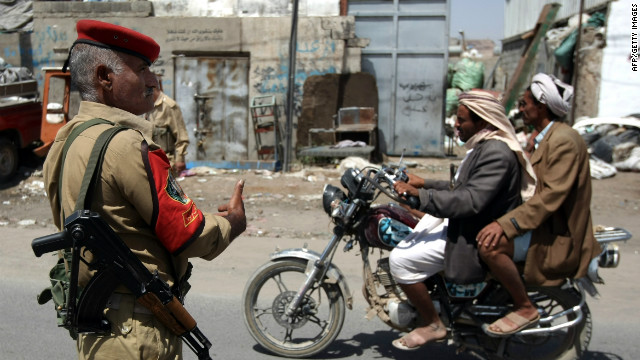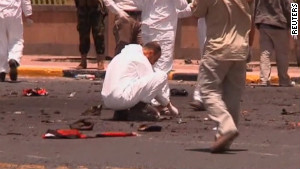May 22, 2012 -- Updated 1026 GMT (1826 HKT)

Suicide blast kills 100+ troops in Yemen
STORY HIGHLIGHTS
- "We are at the outskirts of our final battle" against Ansaar al-Sharia, a military official says
- Ansaar al-Sharia is an affiliate of al Qaeda in the Arabian Peninsula
- More than 100 soldiers were killed and 220 injured on Monday's attack
- Yemen is a central battleground in the fight against al Qaeda
Jihadist websites have
posted a statement purportedly from the group, Ansaar al-Sharia,
claiming responsibility for the attack. But CNN could not independently
verify the authenticity of the statement.
The soldiers killed
Monday were preparing for Tuesday's National Day of Unification
ceremonies in Sanaa when they were attacked. The holiday celebrates the
unification of South Yemen and North Yemen on May 22, 1990, to form
Yemen.
The parade and festivities continued as planned Tuesday, albeit with a somber message.
 Bloodiest suicide bombing shocks Yemen
Bloodiest suicide bombing shocks Yemen
"Our hearts bleed ...
over the martyrdom of our noble soldiers. The criminal terrorists tried
to kill our joy, but we will overcome their barbaric attack, and we will
always triumph because we will never allow them to assassinate our
dream in building a better nation," military chief of staff Ahmed
al-Ashwal told the crowd.
He added, "We assure to
you ... that we are at the outskirts of our final battle, God willing,
in our fight with what is known as Ansaar al-Sharia so we can restore
peace and security to every part of our dear nation."
Monday's explosion
appeared to be the deadliest attack ever on troops in Yemen. It left at
least 101 dead and more than 220 injured -- some in critical condition,
authorities said.
More than an hour after
the attack, there were still bodies at the blood-spattered scene. Some
ambulances carried six or seven victims each, an official said.
"We heard a massive
explosion. Minutes later, there were so many emergency vehicles, it
seems as if hundreds were injured," said resident Ali al-Husseini, who
was near the attack.
The partially lawless
Middle Eastern country has become a central battleground in the fight
against al Qaeda. The terror network's leader recently called for an
uprising against the new president.
The Yemeni branch of the group calls itself al Qaeda in the Arabian Peninsula; Ansaar al-Sharia is an affiliate of AQAP.
The attack took place about 200 meters (218 yards) from the presidential palace.
President Abdrabuh Mansur Hadi fired top security officials, including a nephew of the former president, after the attack.
Gen. Ammar Saleh was
sacked as director of the National Security Bureau, said a Yemeni
official who is not authorized to speak to the media. He is being
replaced by Maj. Gen. Mohammed Jameh al-Khadar.
Saleh may keep a second and more important post, as first deputy for national security.
The head of central
security, Abdul Malik al-Tayyeb, was fired by presidential decree after
the attack. He is being replaced by Fadhl al-Qosi.
U.N. Secretary-General Ban Ki-moon condemned the attack and called for the perpetrators to be held accountable.
"The secretary-general
calls on all in Yemen to reject the use of violence in all its forms and
manifestations, and expects them (to) play a full and constructive role
in implementing Yemen's political Transition Agreement," a statement
from his office said.
In the United States,
chief White House counterterrorism adviser John Brennan called the
Yemeni president Monday to convey President Barack Obama's "deep
condolences for the cowardly terrorist attack," the White House said in a
statement. Brennan also offered U.S. assistance on the investigation.
"Mr. Brennan and
President Hadi reaffirmed the unshakable partnership between Yemen and
the United States, and President Hadi pledged not to let terrorist acts
interfere with Yemen's peaceful political transition," the statement
said.
Monday's attack came a
day after three American contractors working with Yemen's coast guard
were wounded in a shooting in the port city of Hodeida, two local
security officials said.
One person has been arrested in the attack, the sources said.
Last week, al Qaeda's leader called for the Yemeni people to rise up against the country's new president, portraying him as the stooge of the unpopular former president, Ali Abdullah Saleh, and the United States.
"So, Ali Abdallah Saleh
is gone, and his successor Abed Rabbo Mansour Hadi has taken over," al
Qaeda chief commander Ayman al-Zawahiri said in a video posted on
jihadist forums.
Saleh, who led Yemen for
30 years, relinquished power last year after an extended popular
uprising in a transition agreement that was supported by the United
States. Hadi was Saleh's vice president, and al Qaeda has exploited the
connection to stir resentment against the new government.
Last year, Ansaar
al-Sharia, the al Qaeda offshoot, took over the majority of districts in
the southern Abyan province, benefiting from the political turmoil in
the country. Numerous military bases were evacuated, making it easier
for militant groups to grow in power and territory.
On Sunday, fierce
clashes between government troops and al Qaeda fighters left 21 people
dead, two local security officials said.
The officials said the
violence erupted when hundreds of troops attempted to sweep through
areas around the district of Jaar, the main stronghold for al Qaeda in
Abyan province.
Al Qaeda fighters fought
back, kicking off clashes that continued for nine hours, the officials
said. Fourteen militants and seven troops were killed in the fighting,
they said.
Government forces have
been battling fighters loyal to the local branch of al Qaeda for more
than a year but have not made lasting headway.
The United States has
carried out dozens of drone strikes against militants in Yemen,
including the radical American-born cleric Anwar al-Awlaki, who was
killed in September.
U.S. officials said last
month they had foiled a plot to bring down a U.S.-bound aircraft with a
device that originated in Yemen.
The plot was brought to authorities' attention by a mole who infiltrated al Qaeda, a source in the region told CNN.
The mole works for Saudi intelligence, which has cooperated with the CIA for years, the source said.
Information from the
mole also led to a drone strike this month that killed Fahd al Quso, 37,
whom the U.S. considered a senior operative of al Qaeda in the Arabian
Peninsula.
CNN's Elise Labott contributed to this report.


No comments:
Post a Comment